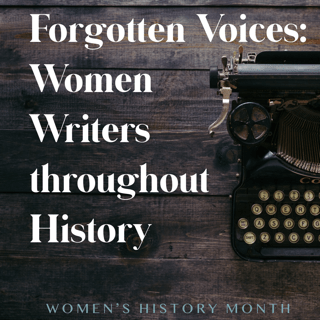*We at ZCenter recognize and celebrate Women’s History Month, but we do offer all of our services to all individuals regardless of how they identify. We acknowledge the use of womxn as an inclusive term, but choose to maintain the use of women, as many do not feel included in the use of womxn. We believe transgender women are women, which is why choose to continue the use of women.
In honor of Women’s History Month, the March blogs will focus on forgotten voices of major women figures throughout history. This week, we highlight only a few women writers who too often go unnoticed in a literary world dominated by the cisgender white male voice.
Enheduanna, two millennia before the Christian messiah, grasps the lapiz lazuli around her neck, takes in the night sky, and writes her soul into poetry as she honors the goddess Inanna. She gazes toward the Gate of Wonder as hymns to the Queen of Heaven and Earth flow onto her clay tablets (De Shong Meador, 2000). A woman, writing praise to a goddess, suspends her own place as one living under the shadow of her father Sargon. In an ancient world dominated by warring men, Enheduanna, the first known female poet and first known author by name, writes her own world.
She is Inanna
Bearer of Happiness
Whose strapping command
Hip-dagger in hand
Spreads radiance over the land
-excerpt from Lady of Largest Heart by Enheduanna (De Shong Meador, 2000)
As male Babylonian warriors siege Jerusalem, Sappho centers the 6th Century BCE Mediterranean world on Helen, Hera, Hermione, Hékate, and Aphrodite (Sappho, 2007). Sappho’s poems remind us that we can re-center the narrative; the story becomes what we choose.
But stand before me, if you are my friend,
and spread the grace that’s in your eyes.
– (Sappho, 2007, p.34)
Hékate, the shining gold attendant of Aphrodite…
Like a child to her mother I have flown to you.
– (Sappho, 2007, p.41-42)
In 17th Century Mexico, Sor Juana Inés de la Cruz was a prolific writer in her matricentric world, even referred to now as a protofeminist and ecofeminist (Yagar, 2014). Centering her poetry in the Nahua people’s cosmic worldview, Sor Juana challenged the gender inequalities of her time. Of particular interest is her poem Hombres Necios, in which she describes the hypocrisy of men who demand that unmarried women are virgins, when it is the same men who take that virginity.
Hombres necios que acusáis
a la mujer sin razón,
sin ver que sois la ocasión
de lo mismo que culpáis
Foolish men who accuse
women without reason,
without seeing that you’re to blame
for the very thing that you accuse
– excerpt from Hombres Necios (Sor Juana Inés de la Cruz, 1997)
As we work to end sexual violence, we carry a torch that was lit many millennia ago by brave, autonomous women like these three writers. In their poetry, may we find the inspiration to continue to fight oppression for all.
Works Referenced:
De Shong Meador, B. (2000). Inanna: Lady of Largest Heart. University of Texas Press.
Sappho. (2007). Poetry of Sappho (J. Powell, Trans.). Oxford University Press. http://www.projethomere.com/ressources/Sappho/Poetry-of-Sappho.pdf
Yugar, T.A. (2014). Sor Juana Inés de la Cruz: Feminist Reconstruction of Biography and Text. Wipf and Stock Publishers.
Sor Juana Inés de la Cruz. (1997). Obras completas (México, D.F.: Porrúa, 1997), 109.
Written by Kristin Jones, Outreach Supervisor
All ZCenter blog posts are written by state certified staff, interns, and volunteers. For questions on authorship or content, please email kjones@zcenter.org.

